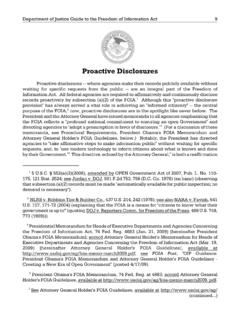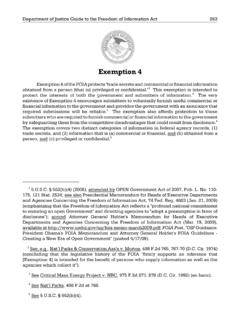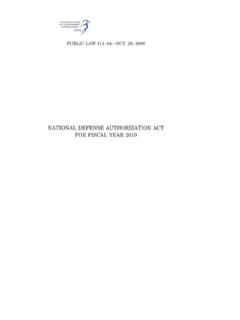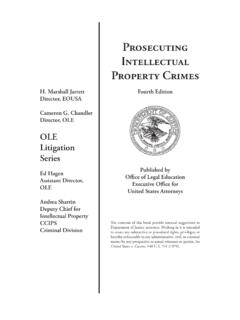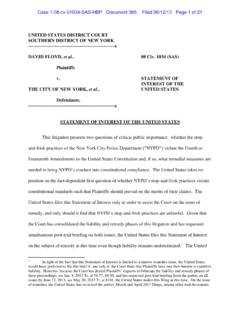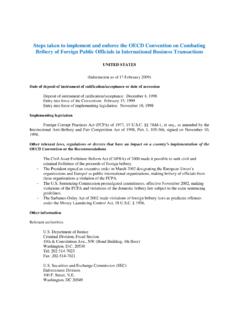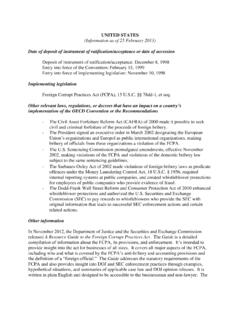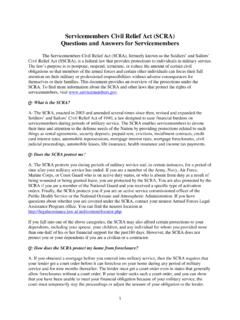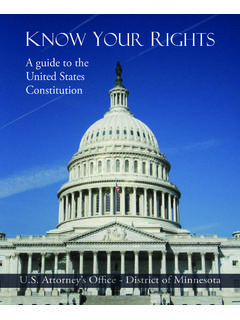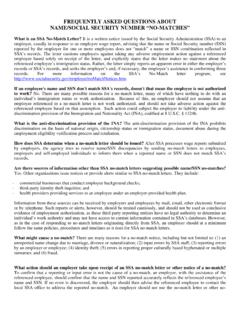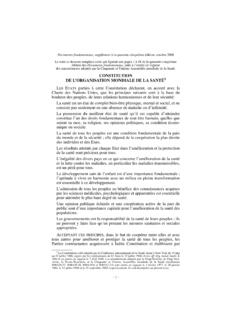Transcription of ADMINISTRATIVE PROCEDURE ACT
1 ADMINISTRATIVE PROCEDURE ACT [PUBLIC LAW 404 79TH CONGRESS] [CHAPTER 324 2D SESSION] [S. 7] AN ACT To improve the administration of justice by prescribing fair ADMINISTRATIVE PROCEDURE Be it enacted by the Senate and House of Representatives of the United States of America in Congress assembled, TITLE SECTION 1. This Act may be cited as the " ADMINISTRATIVE PROCEDURE Act". DEFINITIONS SEC. 2. As used in this Act (a) AGENCY. "Agency" means each authority (whether or not within or subject to review by another agency) or the Government of the United States other than Congress, the courts, or the governments of the possessions, Territories, or the District of Columbia. Nothingin this Act shall be construed to repeal delegations of authority as provided by law. Except as to the requirements of section 3, there shall be excluded from the operation of this Act (1) agencies com posed of representatives of the parties or of representatives of organ izations of the parties to the disputes determined by them, (2) courts martial and military commissions, (3) military or naval authorityexercised in the field in time of war or in occupied territory, or (4)functions which by law expire on the termination of present hos tilities, within any fixed period thereafter, or before July 1,1947, and the functions conferred by the following statutes: Selective Training and Service Act of 1940; Contract Settlement Act of 1944; Surplus Property Act of 1944.
2 (b) PERSON ANDPARTY. "Person"includes individuals, partner-ships, corporations, associations, or public or private organizations of any character other than agencies. "Party" includes any person or agency named or admitted as a party, or properly seeking and entitled as of right to be admitted as a party, in any agency proceed ing; but nothing herein shall be construed to prevent an agencyfrom admitting any person or agency as a party for limited purposes. (c) RULE AND RULE MAKING. "Rule" means the whole or any part of any agency statement of general or particular applicability 1 2 ADMINISTRATIVE PROCEDURE and future effect designed to implement, interpret, or prescribe law or policy or to describe the organization, PROCEDURE , or practice require ments of any agency and includes the approval or prescription for the future of rates, wages, corporate or financial structures or reorganiza tions thereof, prices, facilities, appliances, services or allowances there-for or of valuations, costs, or accounting, or practices bearing upon any of the foregoing.
3 "Rule making" means agency process for the formulation, amendment, or repeal of a rule. (d) ORDER AND ADJUDICATION. "Order" means the whole, or any part of the final disposition (whether affirmative, negative, injunctive, or declaratory in form) of any agency in any matter other than rule making out including licensing. "Adjudication" means agency process for the formulation of an order. (e) LICENSE AND LICENSING. "License" includes the whole or part of any agency permit, certificate, approval, registration, charter, mem bership, statutory exemption or other form of permission. "Licens ing" includes agency process respecting the grant, renewal, denial, revocation, suspension, annulment, withdrawal, limitation amendment, modification, or conditioning of a license. (f) SANCTION AND RELIEF. "Sanction" includes the whole or part of any agency (1) prohibition, requirement, limitation, or other con dition affecting the freedom of any person; (2) withholding of relief; (3) imposition of any form of penalty or fine; (4) destruction, taking, seizure, or withholding of property; (5) assessment of dam-ages, reimbursement, restitution, compensation, costs, charges, or fees; (6) requirement, revocation, or suspension of a license; or (7) taking of other compulsory or restrictive action.
4 "Relief" includes the whole or part of any agency (1) grant of money, assistance, license, authority, exemption, exception, privilege, or remedy; (2) recognition of anyclaim, right, immunity, privilege, exemption, or exception; or (3)taking of any other action upon the application or petition of, and beneficial to, any person. (g) AGENCY PROCEEDING AND ACTION. "Agency proceeding" means any agency process as defined in subsections (c), (d), and (e) of this section. "Agency action" includes the whole or part of every agencyrule, order, license, sanction, relief, or the equivalent or denial thereof, or failure to act. PUBLIC INFORMATION SEC. 3. Except to the extent that there is involved (1) any function of the United States requiring secrecy in the public interest or (2) any matter relating solely to the internal management of any agency (a) RULES. Every agency shall separately state and currentlypublish in the Federal Register (1) descriptions of its central andfield organization including delegations by the agency of final author ity and the established places at which, and methods whereby, the public may secure information or make submittals or requests; (2) statements of the general course and method by which, its functions are channeled and determined, including the nature and requirements of all formal or informal procedures available as well as forms and instructions as to the scope and contents of all papers, reports, or examinations.
5 And (3) substantive rules adopted as authorized bylaw and statements or general policy or interpretations formulated ADMINISTRATIVE PROCEDURE 3 and adopted by the agency for the guidance of the public, but not rules addressed to and served upon named persons in accordance with law. No person shall in any manner be required to resort to organization or PROCEDURE not so published. (b) OPINIONS AND ORDERS. Every agency shall publish or, in accordance with published rule, make available to public inspection all final opinions or orders in the adjudication of cases (except those required for good cause to be held confidential and not cited as precedents) and all rules. (c) PUBLIC RECORDS. Save as otherwise required by statute, mat ters of official record shall in accordance with published rule be made available to persons properly and directly concerned except informa tion held confidential for good cause found.
6 RULE MAKING SEC. 4. Except to the extent that there is involved (1) any military, naval, or foreign affairs function of the United States or (2) any matter relating to agency management or personnel or to public property, loans, grants, benefits, or contracts (a) NOTICE. General notice of proposed rule making shall be pub lished in the Federal Register (unless all persons subject thereto are named and either personally served or otherwise have actual notice thereof in accordance with law) and shall include (1) a statement of the time, place, and nature of public rule making proceedings; (2)reference to the authority under which the rule is proposed; and (8)either the terms or substance of the proposed rule or a description of the subjects and issues involved. Except where notice or hearing is required by statute, this subsection shall not apply to interpretative rules, general statements of policy, rules of agency organization, pro cedure, or practice, or in any situation in which the agency for good cause finds (and incorporates the finding and a brief statement of the reasons therefor in the rules issued) that notice and public pro cedure thereon are impracticable, unnecessary, or contrary to the public interest.
7 (b) procedures . After notice required by this section, the agencyshall afford interested persons an opportunity to participate in the rule making through submission of written data, views, or arguments with or without opportunity to present the same orally in any man ner; and, after consideration of all relevant matter presented, the agency shall incorporate in any rules adopted a concise general state ment of their basis and purpose. Where rules are required by statute to be made on the record after opportunity for an agency hearing, the requirements of sections 7 and 8 shall apply in place of the provisions of this subsection. (c) EFFECTIVE DATES. The required publication or service of anysubstantive rule (other than one granting or recognizing exemption or relieving restriction or interpretative rules and statements of pol-icy) shall be made not less than thirty days prior to the effective date thereof except as otherwise provided by the agency upon good cause found and published with the rule.
8 (d) PETITIONS. Every agency shall accord any interested person the right to petition for the issuance, amendment, or repeal of a rule. 4 ADMINISTRATIVE PROCEDURE ADJUDICATION SEC. 5. In every case of adjudication required by statute to be deter-mined on the record after opportunity for an agency hearing, except to the extent that there is involved (1) any matter subject to a subse quent trial of the law and the facts de novo in any court; (2) the selection or tenure of an officer or employee of the United States other than examiners appointed pursuant to section 11; (3) proceedings in which decisions rest solely on inspections, tests, or elections; (4) the conduct of military, naval, or foreign affairs functions; (5) cases in which an agency is acting as an agent for a court; and (6) the certifi cation of employee representatives (a) NOTICE.
9 Persons entitled to notice of an agency hearing shall be timely informed of (1) the time, place, and nature thereof; (2) the legal authority and jurisdiction under which the hearing is to be held; and (3) the matters of fact and law asserted. In instances in which private persons are the moving parties, other parties to the proceeding shall give prompt notice of issues controverted in fact or law; and in other instances agencies may by rule require responsive pleading. In fixing the times and places for hearings, due regard shall be had for the convenience and necessity of the parties or their representatives. (b) PROCEDURE . The agency shall afford all interested parties opportunity for (1) the submission and consideration of facts, argu ments, offers of settlement, or proposals of adjustment where time, the nature of the proceeding, and the public interest permit, and (2) to the extent that the parties are unable so to determine any contro versy by consent, hearing, and decision upon notice and in conformity with sections 7 and 8.
10 (c) SEPARATION OF FUNCTIONS. The same officers who preside at the reception of evidence pursuant to section 7 shall make the recom mended decision or initial decision required by section 8 except where such officers become unavailable to the agency. Save to the extent required for the disposition of ex parte matters as authorized by law, no such officer shall consult any person or party on any fact in issue unless upon notice and opportunity for all parties to partici pate; nor shall such officer be responsible to or subject to the super-vision or direction of any officer, employee, or agent engaged in the performance of investigative or prosecuting functions for any agency. No officer, employee, or agent engaged in the performance of investi gative or prosecuting functions for any agency in any case shall, in that or a factually related case, participate or advise in the decision, recommended decision, or agency review pursuant to section 8 except as witness or counsel in public proceedings.
